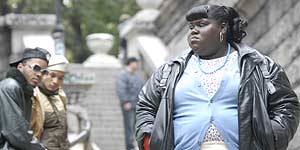Precious
-
Katy Sian: Movie Review, Feb 2010
-
Precious (2010) Directed by Lee Daniels
‘Negroes are savages, brutes, illiterates. But in my own case I knew those statements were false. There was a myth of the Negro that had to be destroyed at all costs’ (Fanon)
Precious takes us on a harrowing journey of a teenage girls life living in Harlem 1980s, she is raped by her father who impregnates her twice, bullied by her mother, illiterate, poor, overweight, she learns she has HIV passed on by her father, and of course she is Black. Critics in America are on two opposing camps, on the one hand it is argued that the film shows the ‘reality’ of Black teens living in the USA in which the life of Black people is far from the perfect picture as illustrated by the Cosby Show. On the other hand it has been condemned for adopting a plethora of racist tropes which work to place Blacks firmly in the position of inferiority.
What is remarkable about this film, as with many other cultural registers portraying Blacks, is the way in which they feed the history of the west and its stereotypes of what Blackness is. Such portrayals adopt an overwhelmingly Manichean view of the world in which Blacks are either savage, primitive and troublesome, or they are exceptional, special and extraordinary. There is no room for grey areas, Blacks are deemed unable to fit within any other categories, Black as ‘normal’, Black as ‘average’, Black as ‘human’ escapes these illustrations for that means Black is ‘us’. There is a clear hierarchy in play when we are presented with depictions of Blackness, that is, the overshadowing, racist and colonial binary which operates to place Blacks as slaves and whites as masters.
The film fails to escape the dominant racialised discourse through its use of stereotypical representations which are all too evident throughout the film, from when we see Precious stealing and scoffing a bucket of fried chicken, or her lazy mothers insistency on scamming the welfare system, to Precious looking in mirror only to see a pretty white girl staring back at her, or her crush on her handsome white teacher. The list goes on, not forgetting that the saviours throughout this tale comprise of a beautiful light skinned teacher and Mariah Carey, the racially ambiguous social worker. There appears to be no attempt by the film-maker to dispel any myths of Blackness, instead we are presented with a self-loathing of Blackness, as such he successfully restores and reaffirms racist tropes rather than question them. One must not dismiss however that Blacks in America remain subjugated, exploited and marginalized, Black men remain over-represented in the criminal justice system and experience the worst poverty, housing, education and healthcare. To some extent the film taps into such social injustices, but where it ultimately fails is through its negative emphasis of these ‘Black’ experiences, rather than its interrogation of the racist structures which have and continue to enable these particular experiences to operate which would have perhaps been more useful. Instead of illustrating or providing the racialised context to understand how the experiences of Precious and others like her have come into being, we see the all too familiar sinister racial pathologisation of Blacks, and the dangers of this comes when people conclude that Blacks are the way they are because they are Black. The film concludes with Precious leaving her unfit mother and going off into the big wide world with her son to find her peace, alas the ideas of western romantic liberalism and the cult of the individual saves the day.
‘We shall see that another solution is possible. It implies a restructuring of the world…’ (Fanon)








0 Responses to “Precious”